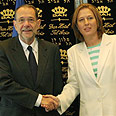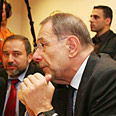

Solana: Why are ministers warning of outpost evacuation?
EU foreign policy chief says he feels peace process is being stalled; adds he expects both sides to speed up Road Map. Foreign Minister Livni during joint press conference: Quartet's terms have proved to be correct, a change can already be felt
As far as we are concerned, the Road Map still exists and both Israel and the Palestinians must meet their commitment to its first stage, Solana said. He added that he was worried after hearing one of the Israeli ministers say outposts and settlements must not be touched.
"We have the feeling that it is now stalled," Solana said, referring to the peace process. We want to move forward toward a dialogue, for the sake of hope, he added.
"We the Europeans are more committed than ever" to the stalled peace drive, he said, in order to bring about a safer situation for both people.
Solana said that the bottom line was two states for two people, which will live in peace and security according to the Road Map's principles.
Minister Livni said that things on the ground must be changed, in order to bolster Abbas and convey a message to the Palestinian people that a change can take place, "but all this cannot happen while Hamas controls their lives."
Livni: World cannot afford a nuclear Iran
In an optimistic tone, she claimed that the firm stance had good outcomes, in terms of the Quartet's terms.
"Surprisingly, to those who doubted it, these terms are working and we are already witnessing a change, a change of the situation in the field and inside the Palestinian population. The extremists there cannot do whatever they want," she said.
Livni also asked to stress the Iranian threat, ahead of a discussion of the European proposal regarding sanctions at the UN Security Council.
"The world cannot afford a nuclear Iran, and we have to take the necessary steps in order to prevent them from acquiring nuclear technology," she said. "We believe that sanctions must be taken against the Iranians to make them understand that the world cannot accept the continuation of developing nukes.
"The world must also understand that we must not wait for the moment there is a bomb, but have to address the problem during the enrichment process," she added.
Solana briefly addressed the issue, saying that the responsibility lied on the Security Council and that the entire issue was being examined and dealt with.
Peres-Solana meeting
Solana later met with Vice Premier Shimon Peres. Solana asked Peres why Israel was closing the crossings in the Gaza Strip. According to the EU envoy, this situation was creating hunger and frustration, which eventually increase terror activities against Israel.
He stressed that in his diplomatic meetings he was looking for a breakthrough which would lead to halting the circle of blood and changing the diplomatic stagnation between Israel and the Palestinians.
The vice premier added that Israel was committed first and foremost to the security of its citizens, and as long as the firing of missiles at Gaza vicinity communities continues, including the digging of tunnels to smuggle weapons and a "well-oiled" terror mechanism directed at Israel, the crossing won't be opened and Israel will not make any gestures.
Peres added that Hamas was responsible for the dire situation Palestinians were in by casting a collective punishment on them through its behavior.
Also, Peres told Solana that Israel’s government did not derive pleasure from the Palestinian population’s austere situation, but that money transfers should only take place when shootings and the threat to Israeli citizens was no longer.
For four hours, Peres and Solana discussed the issue of kidnapped soldier Gilad Shalit, as well the Iranian nuclear project.
At the end of the meeting, Peres said that he believed negotiations to release Shalit would eventually succeed and that the Palestinians had to be clear on the fact that Israel would only discuss the matter of releasing prisoners after Shalit was freed.
On the Syrian issue, Peres said that Damascus had to decide if it was on the side of peace or terror, and that Israel would not be used as a pawn in Syria’s training against the US.
He also said that Israel would not accept a situation in which Syrian President Bashar Assad speaks of peace and acts and supports terror and violence against Israel.















